Volunteer Project Catalog

Polk County Conservation
Polk County Conservation provides youth summer camps that are designed to encourage hands-on learning through outdoor explorations, activities, games, crafts, and more. Camps are led by naturalists with the assistance of volunteers, our Summer Camp Sidekicks. This opportunity provides a volunteer with a wonderful way to spend time playing, exploring, learning, and teaching while enjoying the camp experience. The inspiring part of this volunteer opportunity is seeing firsthand the difference made in the communities and youth served by Polk County Conservation. Whether you are a high school student seeking to fulfill Silver Cord hours, a college student seeking a graduation requirement, a teacher looking to give back during summer break, or a retiree seeking to rediscover the joys of summer camp - all are welcome to apply to be a Summer Camp Sidekick! This program is designed for volunteers ages 14 and up. Volunteers will assist naturalists leading camps in a variety of tasks such as helping with activities, games, or crafts in an outdoor setting. We may be hiking, getting dirty at the pond, or catching insects in the prairie. Volunteers need to be comfortable being outside in all weather conditions.*Experience is not required and all training will be provided by Polk County Conservation camp staff. All prospective volunteers are expected to: - Fill out the initial application - Complete an additional questionaire - Complete a virtual program training & orientation 2026 day camps are located at Jester Park
How you can help:
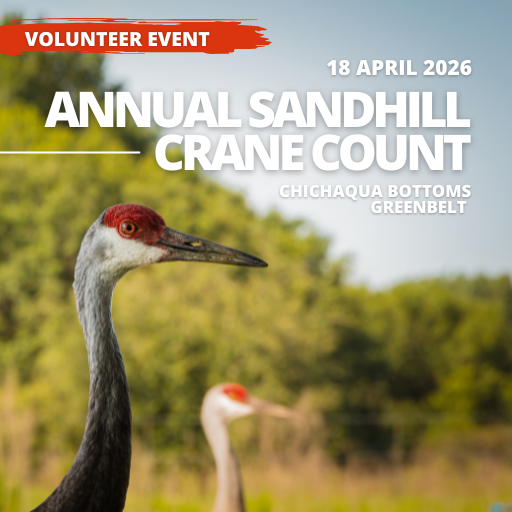
Polk County Conservation
Experience the comeback of midwestern cranes by participating in this exciting wildlife monitoring event as part of the International Crane Foundation’s Annual Midwest Crane Count. In partnership with the International Crane Foundation, Polk County Conservation is calling all bird lovers, newcomers, and avid hobbyists to assist in our annual Sandhill Crane count. Each year in mid-April, over 1,600 volunteers across the Midwest travel to their local wetlands and favorite birding locations to participate in collecting population data. This annual survey of Sandhill and Whooping Cranes spans over 120 counties in Iowa, Wisconsin, Illinois, Michigan, Ohio and Minnesota. In Polk County, this data provides key insights into the effectiveness of our habitat restoration efforts in our management areas. Driving and walking routes will be available at Chichaqua Bottoms Greenbelt to encourage encounters for all types of accessibilities. Participants will need to be familiar with using GPS to record locations of sightings on their phones or other devices. No prior experience necessary. All ages welcome. Ages under 16 with adult supervision. Saturday, April 18th @ 6am to 8:30am 6:00 AM - 6:30 AM: Volunteer sign-in and introductions | 6:30 AM - 8:30 AM: Crane count *Meet at the Natural Resources Headquarters (11204 NE 118th Ave, Maxwell, Iowa). Please register by April 11th. If the event is at capacity, contact Volunteer Coordinators to inquire about participation.
How you can help:

Polk County Conservation
Engage with families at the Jester Park Outdoor Recreation and Wellness Center during our Family Fun Night. This volunteer opportunity includes working with a naturalist to offer a low-cost night of fun for friends and families. Participants will be able to try archery, bouldering, play a variety of family games and puzzles, and make s’mores. Specifically this volunteer will help run our archery range during the event. Previous archery experience is required. Upcoming dates: Friday, March 13 @ 6-8pm Friday, June 26 @ 6-8pm Friday, July 31 @ 6-8pm
How you can help:
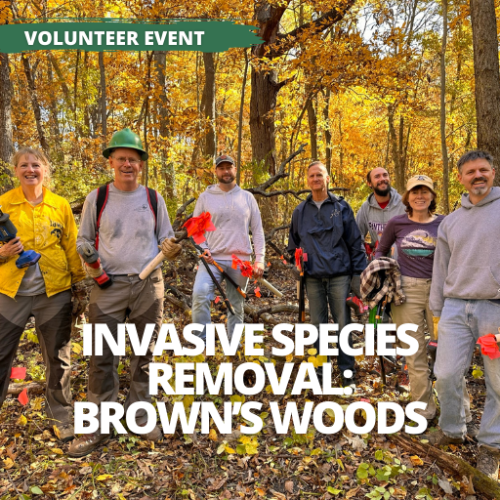
Polk County Conservation
Help restore Iowa’s Woodland habitat by removing harmful invasive species to promote the growth of native trees, grasses, and wildflowers! This volunteer opportunity offers a fun and meaningful service-learning experience. Volunteers will sharpen their skills in identifying both native and nonnative plant species, learn effective invasive removal techniques, and learn ways to positively impact Brown's Woods, Iowa's largest urban forest situated along the Raccoon River. Upcoming Dates: Saturday, Febuary 28th @ 10AM - 12PM* Saturday, March 21st @ 10AM - 12PM *On February 28th, volunteers will be meeting along 63rd street. A detailed email will be sent to all registered volunteers.
How you can help:
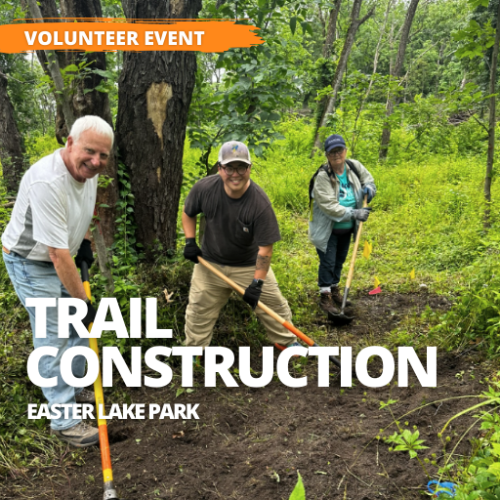
Polk County Conservation
Join us for a day of teamwork, conservation, and community as we finish building a new and improved trail at Easter Lake Park. This is an excellent opportunity for trail enthusiasts to gain entry-level trail construction skills while make a meaningful impact on our local trails. During this event, participants will complete final steps of trail construction to finish this trail's construction. The new layout of this trail system improves the sustainability of the trail system, decreases maintenance, and helps to increase trail accessibility. Equipped with essential tools and guidance from PCC staff, you'll learn the best practices and proper techniques for trail construction. This event will start with a trail construction training follow by trail building activities. This event is designed for beginner to experienced trail building volunteers. This volunteer project has been made possible by passing of the 2021 Polk County Water Land & Legacy Bond, which has provided $10 million towards trails throughout Polk County. Upcoming Dates: Friday, April 3rd @ 10am to 12pm & 1pm to 3pm
How you can help:

Polk County Conservation
Whether you are seeking an inspiring setting in which to give back to the outdoor community; a senior looking to enjoy retirement; or simply wishing to spend quality time in a beautiful county park, all are invited to share their unique talents and passion for the outdoors and conservation with park visitors entering into their adventure at Jester Park. What Will You Do? Volunteers will be serving an important role at the Jester Park Nature Center welcoming visitors into their outdoor adventure at Jester Park. Volunteer Duties: *Welcome and assist visitors *Direct visitors to the various amenities that Jester Park provides *Provide information regarding events and programs *Check in and out Park Packs *Help set up and clean up for programming and events
How you can help:
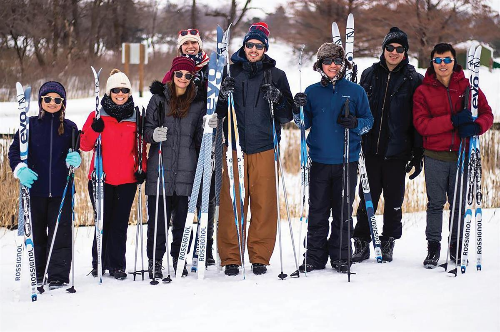
Polk County Conservation
At Jester Park, over 6 miles of cross-country ski trails provide winter recreation opportunities for our local community. Each year, members of the Des Moines Nordic Club in partnership with Polk County Conservation and other members of our community help to maintain the trails and utilize equipment to groom the ski trails as the snow flies. Volunteers can help maintain these trails in primarily two ways: 1) Seasonal maintenance including mowing, removing sticks and other debris from the trails 2) Trail grooming utilizing Polk County Conservation's grooming equipment during the ski season To have either of these roles, volunteers are expected to complete a training provided by Polk County Conservation staff and pass a motor vehicle record check. In addition, volunteers will work closely with members of the Des Moines Nordic Club who provide leadership on annual maintenance and care for these trails.
How you can help:

Polk County Conservation
Are you interested in becoming a water quality monitor volunteer? Across Polk County, volunteers help monitor 70 sites along our local waterways as a part of the Polk County Conservation Water Quality Monitoring Program (PCCWQMP). Each month volunteers monitor sites collecting data on weather, stream conditions, and basic chemical testing (pH, nitrate/nitrite, chloride, phosphate, and dissolved oxygen). WHAT TO EXPECT: TIME COMMITMENT Water quality monitoring occurs the first and/or third weeks of each month of the year. Monitoring takes 15-20 minutes at individual sites during most of the year. In mid-July/early August additional habitat assessments and biological (benthic macroinvertebrate collection) assessments are completed. These assessments typically take 1-2 hours. TRAINING and SUPPLIES All monitors receive free training prior to taking on a monitoring site. Online independent learning modules are available. All supplies, including equipment needed to complete water quality, testing will be provided to each volunteer. Field monitors submit their data through an app. FIELD ENVIRONMENT Monitoring takes places along our local waterways throughout neighborhoods of Polk County. Monitors are asked to monitor in the flow of the stream, although sometimes this is not possible so sampling along bridges is allowed in those cases. If becoming a water quality field monitor sounds like a good fit for you, we encourage you to sign up! After signing up, you will be asked to complete the agreement and the 5 modules of water quality training. Please contact the coordinator if you have questions. Thank you!
How you can help:
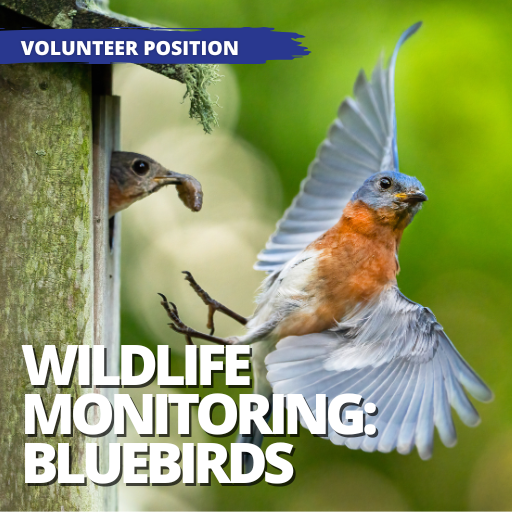
Polk County Conservation
Take a hike on a bluebird box trail and perform weekly monitoring of bluebird nesting and hatchings! Bluebird monitoring gives the public an opportunity to observe native birds in local parks while also observing general populations trends. Bluebird wildlife monitors are assigned a route with nest boxes to observe weekly, collect data and maintain throughout the bluebird breeding seasons, April 1 – August 31. Whether you are a beginner or experienced birder, there is a place for you in our wildlife volunteer program. All wildlife monitor volunteers will be provided training and instruction as needed. Bluebird wildlife monitors are expected to: - Meet with volunteer staff for onboarding and training - Walk their designated route and collect data once a week or more if desired - Remove invasive bird nests - Communicate needs and requests for more training/education if needed - Submit their volunteer hours
How you can help:
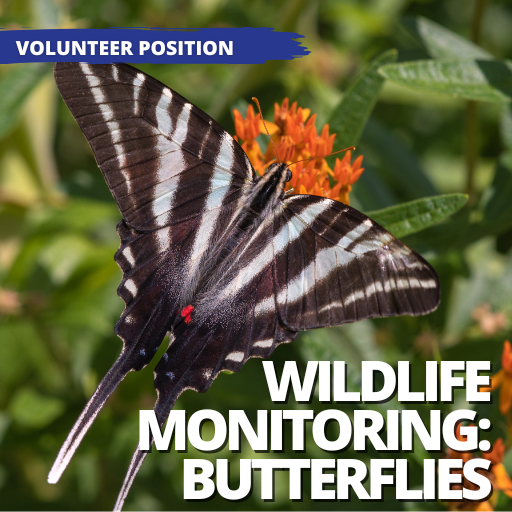
Polk County Conservation
Ever wonder what just flitted by you on a trail? The presence and abundance of butterflies’ act as a good indication of habitat health and are also easily recognizable opportunities for the public to get involved with data collection. Butterfly wildlife monitors are assigned a route to observe 6+ times during butterflies’ most active seasons, June 1 – August 8. Monitors will collect and submit this data. Whether you are a beginner or experienced naturalist, there is a place for you in our wildlife volunteer program. All wildlife monitor volunteers will be provided training and instruction as needed. Snake wildlife monitors are expected to: - Complete a virtual onboarding and training - Walk their designated route and collect data 6 times or more if desired during designated season - Communicate needs and requests for more training/education if needed - Submit their volunteer hours
How you can help:
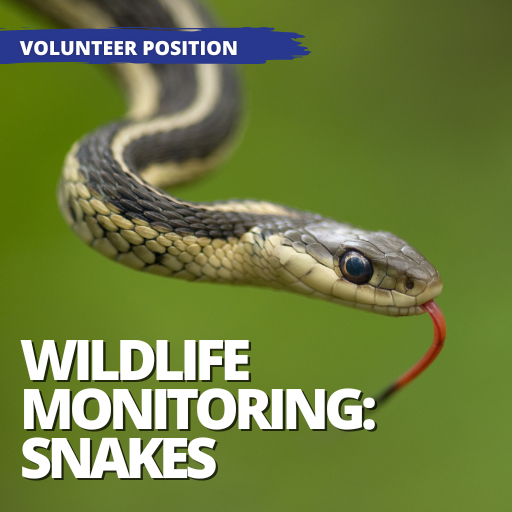
Polk County Conservation
There’s a snake in my prairie! Snake populations give a good indication of habitat health; however, tracking this data can be difficult. Snake wildlife monitors are assigned a route with snake boards to observe weekly, collect data and maintain throughout the snake active seasons, March 20 – October 31. Snake boards are sheets of metal or wood that trap heat and allow reptiles to warm themselves under. Volunteers will lift these boards and collect what species of snake they see. Whether you are a beginner or experienced naturalist, there is a place for you in our wildlife volunteer program. All wildlife monitor volunteers will be provided training and instruction as needed. Snake wildlife monitors are expected to: - Meet with volunteer staff for onboarding and training - Walk their designated route and collect data once a week or more if desired - Communicate needs and requests for more training/education if needed - Submit their volunteer hours
How you can help: